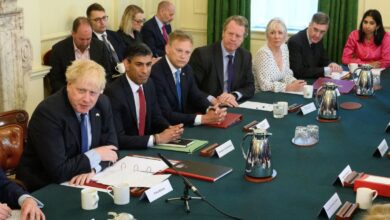Why on Earth Would Anyone Go to a British Party Conference?
Why on earth would anyone go to a British party conference? That’s the question I found myself pondering, and honestly, the answer is far more nuanced than a simple “politics nerds only.” While the image conjured might be rows of suited-and-booted individuals earnestly debating policy minutiae, the reality is a vibrant, chaotic, and surprisingly compelling mix of political maneuvering, networking opportunities, and unexpected social encounters.
It’s a microcosm of British politics, warts and all, and a fascinating spectacle to witness firsthand.
From the high-stakes policy announcements that can shift the national agenda to the behind-the-scenes power plays and the unexpected bursts of drama, a party conference offers a unique window into the inner workings of British politics. It’s a place where future leaders are forged, policy debates are fiercely contested, and the public’s perception of the parties is shaped. But it’s also a place for unexpected connections, chance encounters that can lead to career boosts or impactful collaborations.
This isn’t just about dry political discourse; it’s about the human element – the ambition, the alliances, and the occasional complete and utter chaos.
Political Engagement and Networking
British party conferences offer a unique environment for political engagement and networking, far exceeding the opportunities available through online interactions or even local meetings. The concentrated presence of party members, politicians, journalists, lobbyists, and other key players creates a fertile ground for forging connections and influencing political discourse.Attending a party conference provides unparalleled access to influential figures. The sheer density of individuals involved in shaping political policy makes it an ideal location for building relationships that can prove invaluable in various contexts.
Networking Opportunities at Party Conferences
The potential for networking is immense. From formal events and fringe meetings to informal gatherings in hotel bars and restaurants, opportunities abound to meet and interact with people from across the political spectrum. These connections can range from seasoned MPs and party leaders to rising stars, campaign managers, and policy advisors. Furthermore, journalists attending the conference provide a crucial avenue for disseminating information and shaping public perception.
So, why bother with a British party conference? The sheer expense of it all is enough to make your head spin. I mean, consider this: I just read that ICE issues smartphones to 255,602 illegal border crossers at a cost of $89.5 million annually – that’s insane! It makes you question the priorities of large organizations, and honestly, makes the idea of a political gathering seem almost frivolous by comparison.
Maybe I’ll just stay home and knit.
Strategic networking can lead to media appearances, collaborations on policy initiatives, and access to information not readily available elsewhere.
So, why on earth would anyone willingly subject themselves to a British party conference? The sheer density of political jargon alone is enough to induce a coma, but then you consider the potential for airborne illnesses… I mean, reading about preparations quietly made to screen for ebola at US airports makes you wonder about the biosecurity measures at these events.
Maybe the real risk isn’t the politics, but the germs? Still, the free biscuits are tempting, I guess.
Influence on Political Discourse
Party conferences are not merely gatherings; they are active spaces where political discourse is shaped and influenced. The debates, speeches, and policy announcements made during these events often set the agenda for the coming year, shaping public opinion and influencing government policy. Individuals attending the conferences can directly participate in this discourse by attending meetings, engaging in discussions, and contributing to the overall atmosphere.
Actively engaging with policy debates, sharing perspectives, and building consensus can significantly influence the direction of the party and even national policy.
Examples of Leveraging Party Conferences
Numerous individuals have successfully leveraged party conferences to advance their careers or causes. For example, a young researcher might use the conference to present their findings to relevant MPs, potentially influencing policy related to their area of expertise. A campaigner might use the event to build support for their cause by meeting with key party figures and securing endorsements.
A business leader could use the opportunity to network with government officials, building relationships that could secure future contracts or influence regulatory decisions. A journalist attending the conference can gain exclusive access to interviews and insights, shaping public perception and influencing news coverage.
Hypothetical Scenario Demonstrating Networking Impact
Imagine a young policy advisor, Sarah, attends the Conservative Party Conference. Through diligent networking, she meets a senior MP who shares her interest in environmental policy. This connection leads to an invitation to join a working group on environmental issues, providing Sarah with invaluable experience and exposure to senior decision-makers. Her contributions to the group’s work are recognized, leading to a promotion within her department and enhanced career prospects.
This hypothetical scenario illustrates how strategic networking at a party conference can translate into tangible career advancement and influence on policy.
So, why bother with a British party conference? The sheer political theatre is one reason, I guess. But honestly, sometimes the drama feels miles away from real-world issues. Take, for instance, the news that mccarthy says the defense bill won’t move forward unless the military vaccine mandate is dropped ; that’s a far cry from the debates about local council budgets you’ll hear at these events.
It makes you wonder what truly matters in the grand scheme of things – and whether a party conference is the best place to find out.
Policy Discussions and Debates
British party conferences offer a unique window into the policy priorities of the different political parties. While the atmosphere is often charged with partisan energy, the debates and announcements made during these events significantly shape the national political agenda, influencing public opinion and setting the stage for future legislative battles. The level of detail and the focus of policy discussions vary between parties, reflecting their core ideologies and target voter demographics.Policy debates at British party conferences are often characterized by a blend of detailed policy proposals and broader ideological pronouncements.
The Conservatives, for example, tend to emphasize economic growth and fiscal responsibility, while Labour typically prioritizes social justice and public services. The Liberal Democrats often occupy a centrist position, advocating for a mixture of social and economic policies. Smaller parties, like the Green Party or the Scottish National Party, focus on their specific niche areas, such as environmental protection or Scottish independence, respectively.
The intensity of debate often varies depending on the proximity of a general election, with policy proposals becoming more finely tuned and strategically targeted as the election nears.
Comparative Analysis of Policy Debates
The Conservative Party conference often features discussions around economic management, focusing on issues like tax cuts, deregulation, and infrastructure investment. Labour’s conference usually centers on discussions about social programs, including the National Health Service (NHS), education, and affordable housing. The Liberal Democrats typically debate a range of issues, including electoral reform, environmental policies, and human rights. The level of detail and the specific policy proposals vary from year to year, reflecting the changing political landscape and the priorities of the party leadership.
For example, in a year with a major economic crisis, economic policy would dominate the debates, while in a year with a major social issue at the forefront of public discourse, that issue would become a central focus.
Significance of Specific Policy Announcements
For example, at a recent Conservative Party conference, a significant policy announcement might have been a new initiative aimed at boosting small business growth through tax breaks or reduced regulation. This announcement could have significant implications for the economy, potentially creating jobs and stimulating economic activity. Conversely, at a Labour Party conference, a major policy announcement might have focused on expanding access to affordable childcare or increasing NHS funding.
Such an announcement could significantly impact families and the provision of healthcare services. The significance of these announcements is often judged by their potential impact on the electorate, their feasibility, and their alignment with the party’s overall ideology.
Role of Party Conferences in Shaping the National Political Agenda
Party conferences play a crucial role in shaping the national political agenda by providing a platform for parties to articulate their policy positions, engage in public debates, and respond to current events. The media coverage of these conferences often sets the political narrative for the coming months, highlighting key policy issues and influencing public opinion. Furthermore, the announcements made at these conferences can directly influence government policy, particularly when the ruling party is holding its conference.
The debates and discussions that take place also serve to inform the public about the different political options available and allow for a critical assessment of the parties’ policies.
Key Policy Positions of Different Parties
| Party | Economic Policy | Social Policy | Environmental Policy |
|---|---|---|---|
| Conservative | Fiscal conservatism, tax cuts for businesses, deregulation | Emphasis on individual responsibility, limited welfare state | Gradual transition to renewable energy, focus on technological solutions |
| Labour | Investment in public services, higher taxes on corporations and high earners | Expansion of social programs, increased welfare benefits | Strong commitment to tackling climate change, significant investment in renewable energy |
| Liberal Democrat | Balanced budget, investment in education and infrastructure | Support for social justice, expansion of human rights | Strong environmental policies, commitment to reducing carbon emissions |
| Green Party | Green New Deal, investment in green jobs and sustainable infrastructure | Emphasis on social justice and equality | Radical environmental policies, commitment to rapid decarbonization |
Media Coverage and Public Perception: Why On Earth Would Anyone Go To A British Party Conference
Party conferences, those whirlwind events of political posturing and policy pronouncements, are more than just gatherings of party faithful. They’re meticulously orchestrated media spectacles, shaping public perception and influencing the narrative surrounding each party and its leaders. The media’s role in filtering and framing these events is crucial, determining what the public sees, hears, and ultimately, believes. The 24/7 news cycle, social media buzz, and the relentless pursuit of soundbites all contribute to a complex interplay between political parties and the media landscape.The way media outlets choose to cover party conferences significantly impacts public opinion.
Selective reporting, the emphasis placed on specific events or speeches, and the overall tone of the coverage can sway public sentiment. Positive coverage can boost a party’s popularity, while negative coverage can damage its image and credibility. The framing of issues, the choice of visuals, and even the placement of a story within a news bulletin can all influence how the public interprets the events unfolding at the conference.
For example, a short, positive clip of a leader delivering a rousing speech can be far more impactful than a lengthy, critical analysis of the same speech.
Media Attention at Recent Conferences
Key moments from recent party conferences often dominate news cycles. For example, the Conservative Party conference in 2022 saw significant media attention focused on the mini-budget and the subsequent market turmoil. This event generated widespread debate and analysis, impacting public perception of the government’s economic policies. Similarly, the Labour Party conference that same year saw intense scrutiny of their proposals on taxation and public services.
Specific policy announcements, gaffes by prominent figures, and unexpected events often capture the media’s attention, setting the agenda for public discussion. These high-profile moments can define the narrative surrounding a party’s conference for weeks, even months, to come.
Party Media Strategies
Different parties employ distinct media strategies during their conferences. Some parties prioritize tightly controlled messaging, aiming to present a unified front and carefully manage their image. They might use pre-planned press briefings, carefully choreographed photo opportunities, and targeted social media campaigns to control the narrative. Other parties adopt a more open and less controlled approach, allowing for more spontaneous interactions with the media and potentially greater exposure, albeit with a higher risk of negative coverage.
The choice of strategy often reflects a party’s overall communication style and its risk tolerance. For example, a party with a strong social media presence might use platforms like Twitter and Instagram to disseminate key messages directly to voters, bypassing traditional media outlets to a certain extent.
Fictional News Report: A Key Conference Event, Why on earth would anyone go to a british party conference
Headline: Unexpected U-Turn Shakes Labour Conference Lead: The Labour Party conference in Brighton has been rocked by an unexpected policy reversal on nationalization of the railways. Shadow Transport Secretary, Anya Sharma, announced this morning that the party would be shelving its previously ambitious plans to bring the railways back under public ownership, citing concerns about the cost and potential disruption.
Body: The announcement, made during a press conference, caught many by surprise. The policy had been a central plank of Labour’s platform for several years and had been heavily promoted in the lead-up to the conference. Sharma explained that a recent review of the party’s economic plans had revealed unforeseen challenges in funding the nationalization process. The decision has sparked a mixed reaction amongst Labour delegates, with some expressing disappointment and others acknowledging the pragmatic necessity of the change.
The move has already drawn criticism from opposition parties, who have accused Labour of lacking a clear economic vision. Political analysts are speculating on the impact this U-turn will have on Labour’s standing in the polls.
So, why
-would* anyone go to a British party conference? For the sheer spectacle, the insider access, the networking potential, and the chance to witness history in the making. It’s not for the faint of heart – it’s intense, it’s often exhausting, and it can be utterly unpredictable. But for those willing to dive in, it offers a unique and invaluable perspective on the beating heart of British politics.
It’s a whirlwind of debates, social events, and political maneuvering, leaving you with a deep understanding of the complexities and personalities shaping the nation’s future. And honestly, you might even have a good time while you’re at it.





